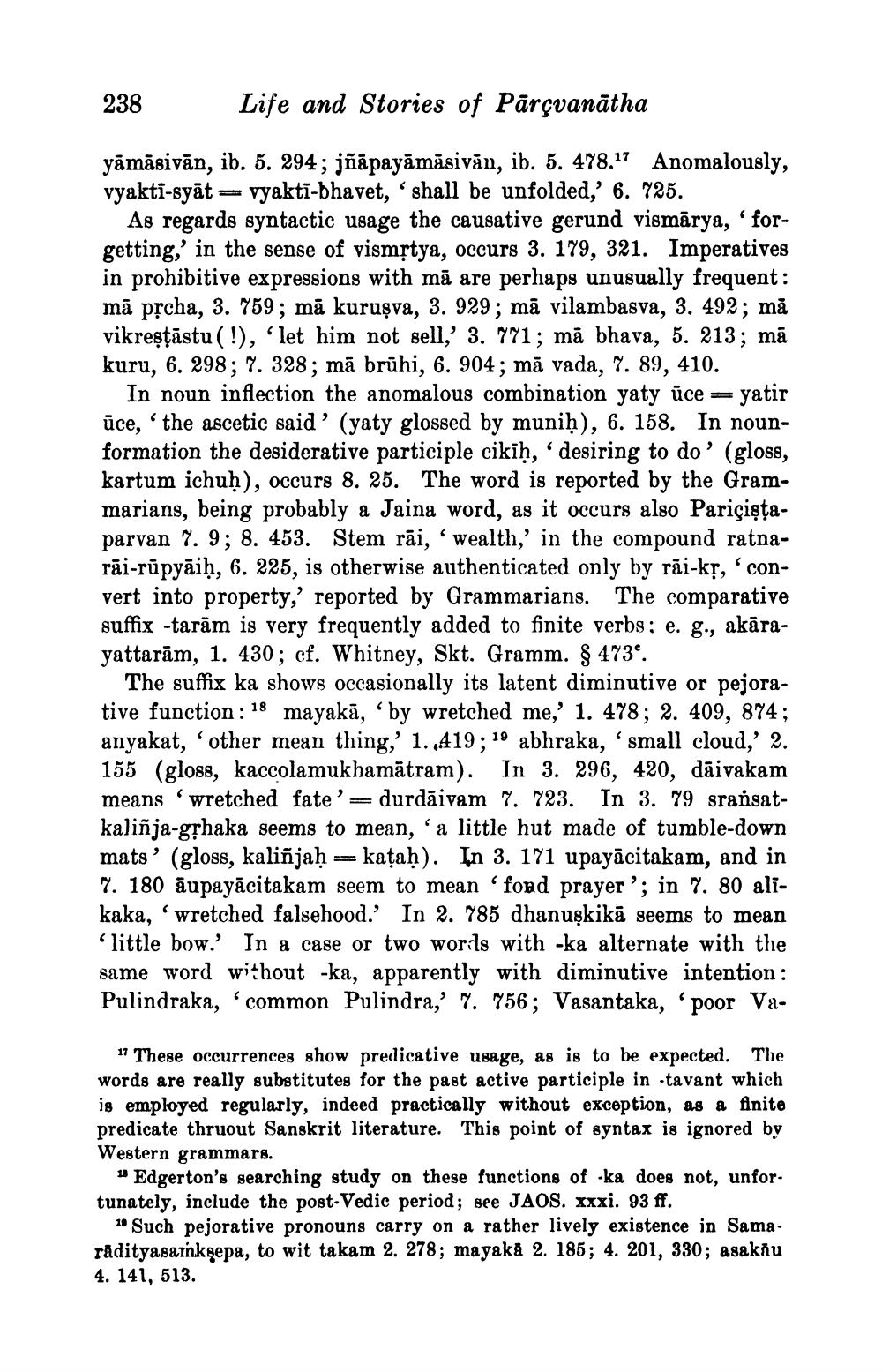________________
238
Life and Stories of Pārçvanātha
yāmāsivān, ib. 5. 294; jñāpayāmāsivān, ib. 5. 478.27 Anomalously, vyakti-syāt = vyaktī-bhavet, shall be unfolded,' 6. 725.
As regards syntactic usage the causative gerund vismārya, 'forgetting,' in the sense of vismộtya, occurs 3. 179, 321. Imperatives in prohibitive expressions with mā are perhaps unusually frequent: mā prcha, 3. 759; mā kuruşva, 3. 929; mā vilambasva, 3. 492; mā vikreştāstu (!), let him not sell,' 3. 771; mā bhava, 5. 213; mā kuru, 6. 298; 7. 328; mā brūhi, 6. 904; mā vada, 7. 89, 410.
In noun inflection the anomalous combination yaty ūce = yatir ūce, 'the ascetic said' (yaty glossed by muniḥ), 6. 158. In nounformation the desiderative participle cikīḥ, 'desiring to do' (gloss, kartum ichuḥ), occurs 8. 25. The word is reported by the Grammarians, being probably a Jaina word, as it occurs also Pariçişțaparvan 7. 9; 8. 453. Stem rāi, 'wealth,' in the compound ratnarāi-rūpyāiḥ, 6. 225, is otherwise authenticated only by rãi-ks, convert into property,' reported by Grammarians. The comparative suffix -tarām is very frequently added to finite verbs; e. g., akārayattarām, 1. 430; cf. Whitney, Skt. Gramm. $ 473o.
The suffix ka shows occasionally its latent diminutive or pejorative function : 18 mayakā, ‘by wretched me,' 1. 478; 2. 409, 874; anyakat, 'other mean thing,' 1.419; 19 abhraka, 'small cloud,' 2. 155 (gloss, kaccolamukhamātram). In 3. 296. 420. dāivakam means 'wretched fate' = durdāivam 7. 723. In 3. 79 sransatkaliñja-grhaka seems to mean, 'a little hut made of tumble-down mats' (gloss, kaliñjaḥ= kataḥ). In 3. 171 upayācitakam, and in 7. 180 āupayācitakam seem to mean fond prayer'; in 7. 80 alikaka, wretched falsehood.' In 2. 785 dhanuskikā seems to mean
little bow.' In a case or two words with -ka alternate with the same word without -ka, apparently with diminutive intention: Pulindraka, 'common Pulindra,' 7. 756; Vasantaka, 'poor Va
17 These occurrences show predicative usage, as is to be expected. The words are really substitutes for the past active participle in tavant which is employed regularly, indeed practically without exception, as a finite predicate thruout Sanskrit literature. This point of syntax is ignored by Western grammars.
» Edgerton's searching study on these functions of ka does not, unfortunately, include the post-Vedic period; see JAOS. xxxi. 93 ff.
1 Such pejorative pronouns carry on a rather lively existence in Samarådityagarnkgepa, to wit takam 2. 278; mayakå 2. 185; 4. 201, 330; asakiu 4. 141, 513.




